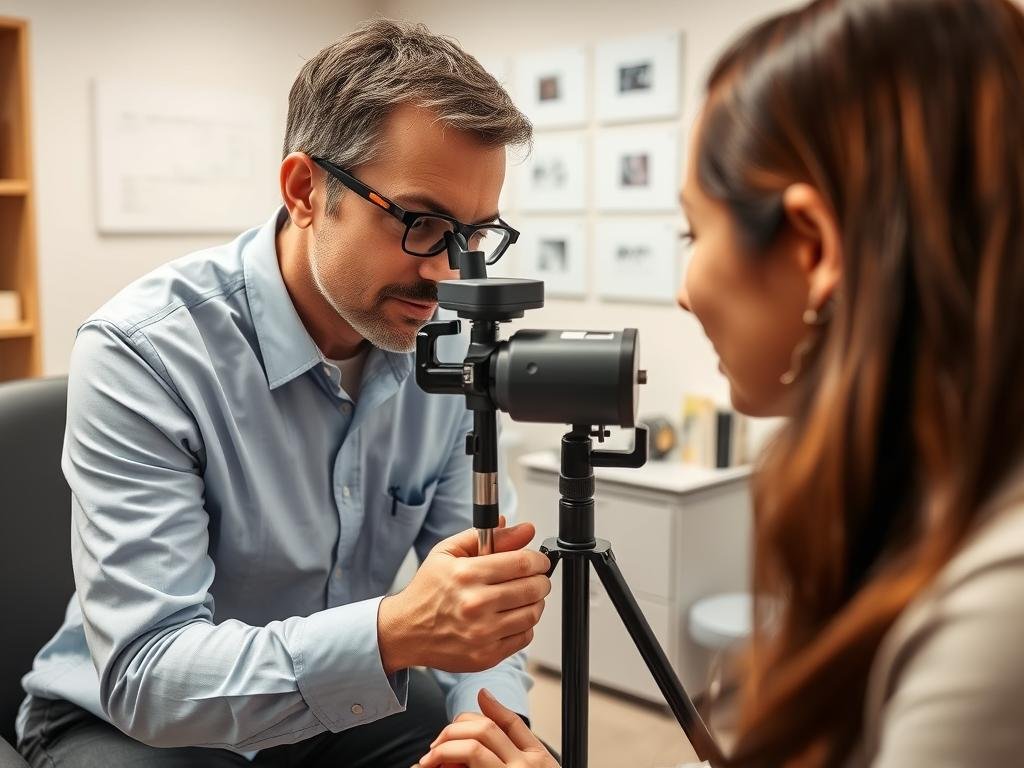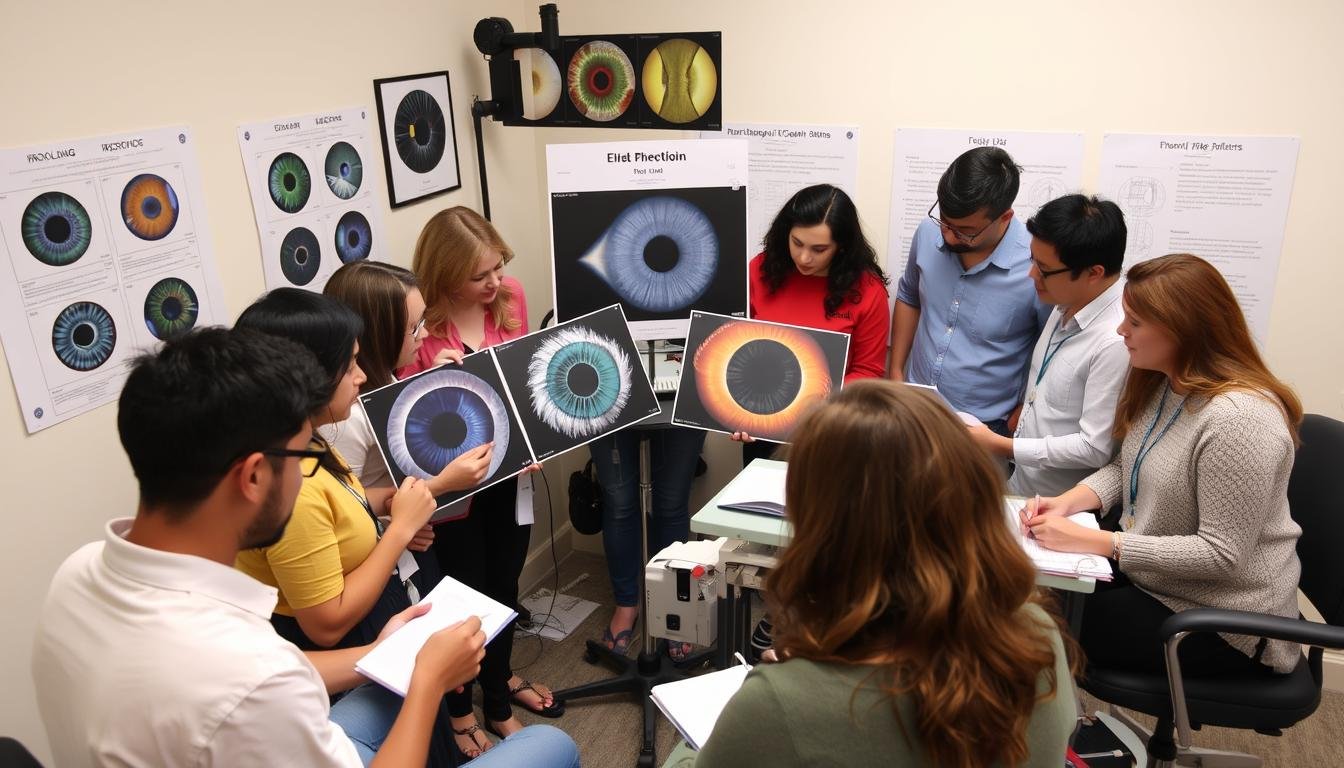The human iris contains a remarkable map of information about our health and well-being. Iridology certification provides practitioners with the skills to interpret these intricate patterns, offering valuable insights into a person’s constitution and potential health vulnerabilities. This comprehensive guide will walk you through everything you need to know about becoming certified in this fascinating field of natural health assessment.
Understanding Iridology: The Foundation of Iridologická certifikácia
Iridológia is the study of the iris, the colored part of the eye, to assess health conditions and predispositions. Dating back over 400 years, this practice has evolved into a recognized assessment tool in natural health. Modern iridologists use specialized equipment to examine the intricate patterns, colors, and markings in the iris that correspond to different areas of the body.
Kľúčové princípy iridológie
- The iris reflects genetic predispositions and constitutional strengths and weaknesses
- Specific areas of the iris correspond to different organs and body systems
- Changes in iris patterns can indicate tissue inflammation, toxin accumulation, or healing
- Iris constitution analysis helps create personalized health protocols
Why Pursue Iridologická certifikácia?
Becoming certified in iridology offers numerous benefits for health practitioners and those interested in natural assessment methods. This credential enhances your professional toolkit and opens new opportunities for client care.
Enhance Your Practice
Add a valuable, non-invasive assessment tool that complements other modalities like nutrition, herbalism, naturopathy, and acupuncture.
Personalized Client Care
Develop the ability to create highly individualized wellness programs based on constitutional analysis and genetic predispositions.
Profesionálna dôveryhodnosť
Gain recognition and trust through formal certification from established organizations in the field of natural health.

How to Get Iridologická certifikácia: 5 Simple Steps
The path to becoming a certified iridologist involves several key steps. While programs may vary, this general roadmap will guide you through the process:
- Research Accredited Programs – Look for schools recognized by professional iridology associations like the International Iridology Practitioners Association (IIPA).
- Complete Prerequisite Education – Many programs require basic knowledge of anatomy, physiology, and pathology (at least Level 3).
- Enroll in a Certification Course – Choose between online, in-person, or hybrid programs depending on your learning preferences and schedule.
- Master Practical Skills – Learn iris photography, analysis techniques, and client assessment methods through hands-on practice.
- Pass Certification Exams – Complete both written and practical examinations to demonstrate your knowledge and skills.
Ready to Begin Your Iridologická certifikácia Journey?
Explore accredited programs and take the first step toward becoming a certified iridologist.
View Top Programs
Top Iridologická certifikácia Programs in 2024
Several reputable institutions offer comprehensive iridology training. Here’s a comparison of leading programs to help you make an informed decision:
| Program | Format | Trvanie | Prerequisites | Accreditation |
| School of Health Iridology Course | Online or Correspondence | 2-3 months | None | Naturopathic associations |
| CNM Certificate in Iridology | In-class or Online | 3 weekends | Level 3 A&P | GNII, ANP |
| CNM Diploma in Iridology | In-class | 3 weekends | Certificate + practitioner status | GNII, ANP |
| New Eden Certified Iridologist | Distance learning | 4-6 months | None | IIPA, IANHP |
| New Eden Certified Iridologist Practitioner | Distance learning | 12-18 mesiacov | None | IIPA, IANHP |

Online vs. In-Person Iridologická certifikácia
Online Programs
- Flexible scheduling for working professionals
- Study at your own pace
- Often more affordable
- Access to international programs
- Digital resources and iris photography guides
In-Person Programs
- Hands-on practice with immediate feedback
- Direct mentorship from experienced iridologists
- Networking with fellow practitioners
- Access to specialized equipment
- Structured learning environment
Many successful practitioners choose hybrid programs that combine online theoretical study with in-person practical workshops for the best of both worlds.

What You’ll Learn in Iridologická certifikácia Programs
Comprehensive iridology programs cover a wide range of topics to ensure you develop both theoretical knowledge and practical skills:
Core Curriculum Components
- History and Theory of Iridology – Evolution of iridology from early practitioners to modern approaches
- Anatomy of the Eye and Iris – Detailed study of iris structures and development
- Iris Topography and Mapping – Learning the correlation between iris zones and body systems
- Ústavná analýza – Identifying genetic predispositions and inherent strengths/weaknesses
- Iris Signs and Markings – Interpreting colors, patterns, and structures in the iris
- Clinical Application – Developing assessment protocols and client recommendations
- Ethics and Practice Management – Professional guidelines and business development
The Benefits of Iridologická certifikácia for Practitioners
Obtaining iridology certification offers numerous advantages for health professionals looking to enhance their practice:
Neinvazívne hodnotenie
Iridology provides valuable health insights without invasive procedures, making it comfortable for clients and easy to integrate into initial consultations.
Preventívny prístup
Identify potential health vulnerabilities before they manifest as symptoms, allowing for truly preventative wellness strategies.
Holistic Perspective
Gain a comprehensive view of client health that considers genetic factors, constitutional tendencies, and current conditions.
“Iridology has transformed my practice by providing insights I couldn’t gain through other assessment methods. The certification process gave me both confidence and credibility with my clients.”
– Lucy C., Certified Iridologist

Common Requirements for Iridologická certifikácia
While requirements vary between programs, most reputable iridology certification courses have certain prerequisites and expectations:
Vzdelávacie predpoklady
- Basic knowledge of anatomy and physiology (Level 3 or equivalent)
- Understanding of fundamental health principles
- For advanced certifications, prior health practitioner status may be required
Equipment Needs
- Access to an iris camera or high-quality magnification device
- Reference materials and iris charts
- Analysis software (for some programs)
Certification Process
- Completion of required coursework (typically 100-200 study hours)
- Practical case studies and documentation
- Written and practical examinations
- Continuing education for maintaining certification
Ready to Take the Next Step?
Request detailed information about certification requirements and upcoming program dates.
Request Program Details
Career Opportunities After Iridologická certifikácia
s iridology certification, practitioners can pursue various career paths and integrate this skill into existing practices:
Súkromná prax
Establish an iridology-focused practice or integrate iris analysis into your existing health services.
Complementary Practitioner
Enhance naturopathy, nutrition, herbalism, acupuncture, or other natural health modalities with iridology assessment.
Vzdelávanie & Research
Teach iridology to others or contribute to the growing research in this field of natural assessment.

Accreditation Bodies for Iridologická certifikácia
When choosing a certification program, look for accreditation from these respected organizations:
- Asociácia Medzinárodných iridológie odborníkov (IIPA) – Global standard-setting organization for iridology education
- Guild of Naturopathic Iridologists International (GNII) – Provides accreditation and professional registration
- Association of Naturopathic Practitioners (ANP) – Recognizes quality iridology training programs
- International Association of Natural Health Practitioners (IANHP) – Offers registration for qualified iridologists
Accreditation ensures your certification will be recognized by peers and provides access to professional insurance and continuing education opportunities.

Success Stories: Iridologická certifikácia in Action
“I fell in love with Iridology during my Naturopathic studies and am so happy I pursued advanced certification. With more in-class practice and expanded lectures, I gradually gained confidence in iris diagnosis. As an Acupuncture practitioner, I’ve found it provides valuable additional insights that complement my other diagnostic tools.”
– Goolnora B., Certified Iridologist
“Having enjoyed the Iridology classes in my Naturopathic Studies, I decided to enroll in the Advanced Iridology Diploma course to deepen my knowledge of this fascinating diagnostic tool. We covered a huge amount of in-depth detail including the emotional and psychological signs that further support iris reading.”
– Lucy C., Certified Iridologist
“I embarked on an Iridology Short Course purely for my own interest. It has become a captivating addition to my Nutritional Therapy business, offering visual insight and immediate feedback on potential health vulnerabilities. It provides a fascinating perspective that gently accompanies other disciplines of healthcare.”
– Kate T., Nutritional Therapist

Často kladené otázky O Iridologická certifikácia
How long does it take to become certified in iridology?
Certification programs range from 2-18 months depending on the level of certification and format (online vs. in-person). Basic certificate programs typically take 3-6 months, while advanced practitioner diplomas may require 12-18 months of study.
Is iridology certification recognized by conventional medical institutions?
Iridology is considered a complementary assessment method rather than a conventional medical diagnostic tool. While not typically recognized by conventional medical institutions, it is well-respected within the natural health community and can be practiced legally in most countries as a non-diagnostic assessment.
What equipment do I need to practice iridology?
At minimum, you’ll need a good quality iris camera or magnification device, proper lighting, reference charts, and analysis materials. Professional-grade iris cameras range from $500-$3000, though some programs include equipment in their tuition or offer rental options.
Can I practice iridology without certification?
While certification is not legally required in most regions, it provides essential training, professional credibility, and access to insurance. Reputable practitioners typically pursue certification to ensure they have the necessary skills and knowledge to practice ethically and effectively.
Začnite svoje Iridologická certifikácia Cesta dnes
Iridology offers a fascinating window into human health through the intricate patterns of the iris. With proper certification, you can develop this valuable skill and enhance your ability to provide personalized, preventative health guidance. Whether you’re an established practitioner looking to expand your toolkit or someone beginning a new career in natural health, iridology certification provides a structured path to mastery.
The journey begins with choosing the right program for your needs, background, and career goals. Consider the accreditation, format, duration, and depth of training as you make this important decision.
Ready to Transform Your Practice with Iridologická certifikácia?
Take the first step toward becoming a certified iridologist by requesting information from accredited programs.
Explore Certification Programs














